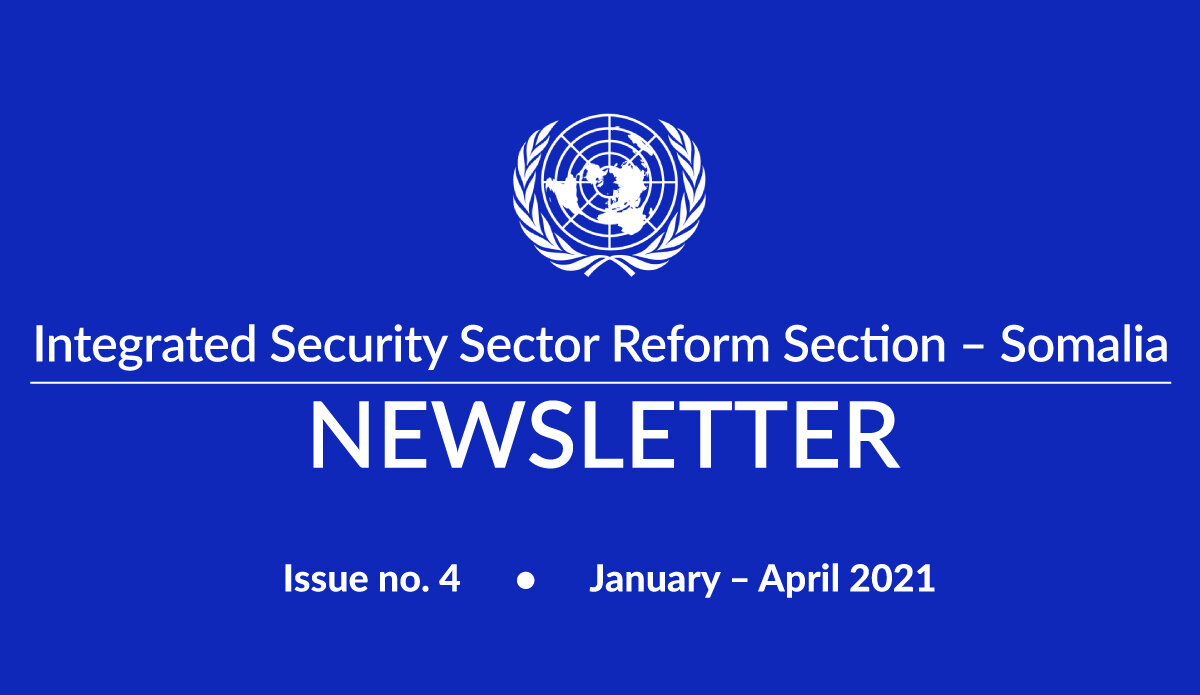NEWSLETTER HIGHLIGHTS
Somalia Maritime Administration working towards attaining Initial Operational Capabilities
The Somalia Maritime Administration (SMA) continues its work towards attaining Initial Operational Capability (IOC) in each of its four Pillars, namely: legal compliance, ship registration, crew certification and the establishment of a Maritime Rescue Coordination Centre (MRCC). From January to April 2021 discussions have progressed through the SMA Working Group monthly meetings, as the main fora to reach agreement on the actions required and to address potential challenges ahead, with participation including the International Maritime Organization (IMO), European Union Capacity Building Mission in Somalia (EUCAP) Somalia, Food and Agriculture Organization (FAO), United Nations Office on Drugs and Crime – Global maritime Crime Programme (UNODC GMCP) and United Nations Environmental Programme (UNEP). Read more...
Advancement of women’s participation in the Somali Security
In March and April 2021, the I-SSR team has convened meetings with the Office of the Prime Minister and Ministry of Defence to discuss women’s participation in the security sector as part of advancing the Women, Peace and Security (WPS) Agenda in Somalia. Read more...
Mainstreaming Women in the Maritime Sector (WiMS) Action Plan across Somalia
The Women in the Maritime Sector (WiMS) initiative was launched by the Federal Government of Somalia (FGS) in 2019 with the support of UNSOM and the European Union Capacity Building Mission in Somalia (EUCAP). The initiative seeks to bring together women in the maritime sector to understand the challenges faced and explore the measures that can be implemented at the level of the FGS and FMS to empower and foster women’s empowerment, meaningful participation and contributions across the maritime community. Read more...
Institutional Capacity Building initiatives
In March and April 2021, the I-SSR team has convened meetings with the Office of the Prime Minister and Ministry of Defence to discuss women’s participation in the security sector as part of advancing the Women, Peace and Security (WPS) Agenda in Somalia. Read more...
Joint Security Sector Governance Programme supporting Federal Member States’ oversight capacity of the security sector
On 10 February and 28 March, the I-SSR team met with the South West State Parliament Speaker and the Chair of the Security and Reconciliation Committee, and Galmudug Parliament Speaker and the Chair of the Security Committee, respectively. The meetings highlighted the growing challenges of both Assemblies to oversee the security sector in an efficient manner, due to a lack of resources and technical expertise. Read more...
Joint Security Sector Governance Programme upcoming closure
The Joint Security Sector Governance Programme (JSSGP) is coming to an end on the 30 June 2021. The programme was valued at approximately 10 million USD and supported in total 15 security oversight institutions with direct funding and 2 more (Federal and State parliaments) with technical capacity building. Read more...
Delivery of office equipment to Regional Security Offices (RSO)
Despite the challenges posed by COVID-19, delivery of office equipment in support of Regional Security Offices (RSOs) has made significant advancements in the January-April 2021 period. RSOs represent an important institution in the context of Somalia’s security policy implementation, contributing to effective decision-making and co-ordination of security programmes between the FGS and FMS. Read more...
Aid mapping initiative
Somalia’s Security Advisory Unit (SAU) within the Office of the Prime Minister has initiated a comprehensive aid mapping exercise that will help the collective understanding of support being given to the rule of law and security sector within the country. Read more...
Somalia Maritime Administration working towards attaining Initial Operational Capabilities
The Somalia Maritime Administration (SMA) continues its work towards attaining Initial Operational Capability (IOC) in each of its four Pillars, namely: legal compliance, ship registration, crew certification and the establishment of a Maritime Rescue Coordination Centre (MRCC). From January to April 2021 discussions have progressed through the SMA Working Group monthly meetings, as the main fora to reach agreement on the actions required and to address potential challenges ahead, with participation including the International Maritime Organization (IMO), European Union Capacity Building Mission in Somalia (EUCAP) Somalia, Food and Agriculture Organization (FAO), United Nations Office on Drugs and Crime – Global maritime Crime Programme (UNODC GMCP) and United Nations Environmental Programme (UNEP).
In-line with SMA’s recent technical level achievements and milestones recorded during 2019-2020, attaining IOC will enable the SMA to effectively perform the basic responsibilities mandated by International maritime law and subsequent national regulations. UNSOM-UNDP Integrated Security Sector Reform (I-SSR) team, along with international partners, have been working closely with the Ministry of Ports and Marine Transport (MPMT) in support of SMA developments and progress, while also contributing to the definition of an effective roadmap to attain domestic IOC. International partners have welcomed the achievements of the SMA to-date.
An important milestone during this period was the re-activation of the SMA Legal Sub-Working Group, chaired by the SMA Head of Legal Affairs Department. Meetings resumed on 30 March with the participation of UNSOM, EUCAP and IMO, and will take place bi-weekly to advance discussions and foster collective work, engagement towards the development of a comprehensive legal and regulatory framework for Somalia.
Advancement of women’s participation in the Somali Security
In March and April 2021, the I-SSR team has convened meetings with the Office of the Prime Minister and Ministry of Defence to discuss women’s participation in the security sector as part of advancing the Women, Peace and Security (WPS) Agenda in Somalia. The Federal Government of Somalia acknowledged the importance of an enabling environment to address the under-representation of women in the security sector and reiterated its commitment to advance women’s recruitment, retention and promotion, and to mainstream gender and the WPS Agenda across the security sector, as enshrined in the ‘Somalia Women’s Charter’ and the ‘Security Pact’ of May 2017.
With funding from the United Nations Department of Political and Peacebuilding Affairs, the I-SSR team will support the Federal and State security institutions and services in identifying national barriers and entry points to increasing women’s meaningful participation in the security sector in Somalia. This cross-ministerial project will focus on leading security ministries and institutions of the security sector within Somalia’s federal structure to promote the WPS Agenda throughout the country’s security institutions. Although the 2017 Security Pact called for the adoption of a “strategy to mainstream gender and the WPS Agenda across the security sector”, and despite the 2019 Women’s Charter for Somalia calling for zero tolerance of gender-based violence, the Convention on the Elimination of All Forms of Discrimination Against Women has yet to be adopted.
Mainstreaming Women in the Maritime Sector (WiMS) Action Plan across Somalia
The Women in the Maritime Sector (WiMS) initiative was launched by the Federal Government of Somalia (FGS) in 2019 with the support of UNSOM and the European Union Capacity Building Mission in Somalia (EUCAP). The initiative seeks to bring together women in the maritime sector to understand the challenges faced and explore the measures that can be implemented at the level of the FGS and FMS to empower and foster women’s empowerment, meaningful participation and contributions across the maritime community.
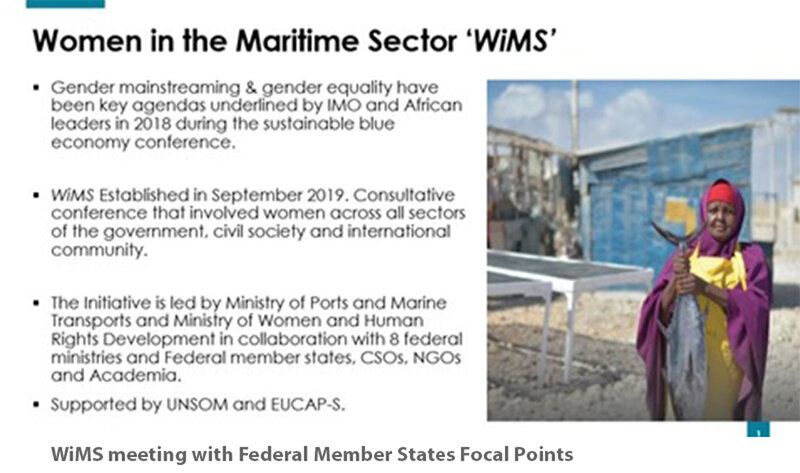
Despite the restrictions imposed by COVID-19, progress has been noted in advancing collaboration among the FGS and Federal Member States (FMS), with focal points nominated by FMS to mainstream the WiMS initiative across Somalia and provide inputs to a draft Action Plan. The first meeting between the FGS, FMS and international partners was convened virtually on 24 Feb 2021, with FMS Focal Points expressing their strong interest in the WiMS initiative and their commitment to promote future engagements to strengthen its implementation. In order to consolidate the WiMS Focal Points network across the FMS, the Ministry of Ports and Marine Transport and Ministry of Women and Human Rights Development circulated a draft WiMS Action Plan seeking FMS inputs to continue the progress of the WiMS initiative and consolidate a concurrent Action Plan that can be presented to international community to secure additional support.
This recent work builds on the first Consultative Conference on Women in the Maritime Sector, which was held in September 2019, after which a Comprehensive Action Plan was developed and agreed by eight (8) FGS Ministries, namely: Ministries of Ports and Marine Transport; Labour and Social Affairs; Education Culture and Higher Education; Justice and Judicial Affairs; Women and Human Rights Development; Planning; Fisheries and Marine Resources; and Internal Security. The Action Plan provides tangible outcomes directly linked to the 2030 Agenda for Sustainable Development; the WPS Agenda, through the UN Security Council Resolution 1325 (2000); the Women’s Charter for Somalia (2019), and the National Development Plan 9 (NDP 2020-2024). It includes deliverables such as the inclusion of a Maritime Section in the National Action Plan for the implementation of UNSCR 1325, awareness campaigns to encourage young women to seek careers in the maritime sector, and possible donor support to maritime cooperatives for women and educational programmes.
Institutional Capacity Building initiatives

Virtual training on Article 76 of the Laws of the Sea was organized by the United Nations Division for Ocean Affairs and the Law of the Sea, Office of Legal Affairs (DOALOS/OLA), with the support of UNSOM, from 19 to 27 April and involved 20 participants from FGS and FMS maritime authorities and academia. The training received very good reviews and feedback from the participants, who requested further maritime focused training opportunities as a way of increasing the importance of the maritime domain within Somalia.
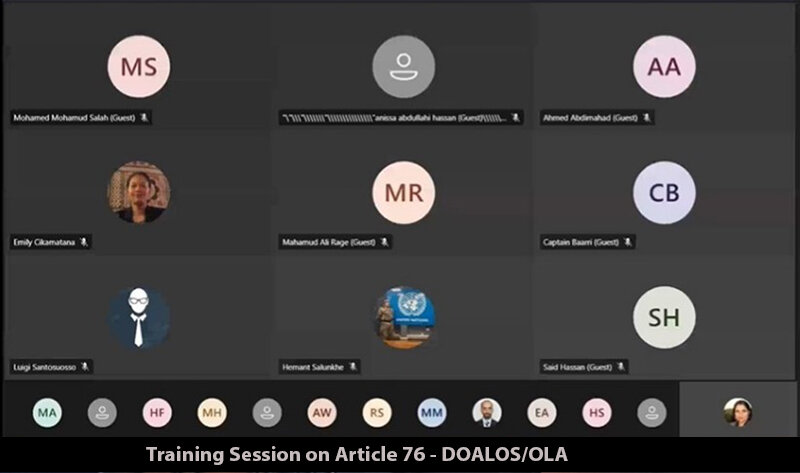
Looking ahead, and as a continuation of the ‘Technical Training Programme in Ocean Affairs and the Law of the Sea for Maritime Law Enforcement Authorities’ under Project 89, delivered in 2020 by DOALOS/OLA and UNSOM, a second training programme for officials from the FGS, FMS and academia who are actively working on maritime issues is planned to commence in May 2021.
The new training activities will focus on the international legal and institutional frameworks for ocean governance, including the international framework for the conservation and sustainable use of oceans and their resources, and will be delivered virtually over 5 days. Other United Nations Specialized Agencies, Funds and Programmes, and relevant subject matter experts from academic institutions, will be invited to contribute to the development and delivery of the training sessions. The design of the programme is being undertaken in consultation with the FGS to ensure that the curriculum is tailored to the national interests and priorities of Somalia, including with respect to its security and development agenda.
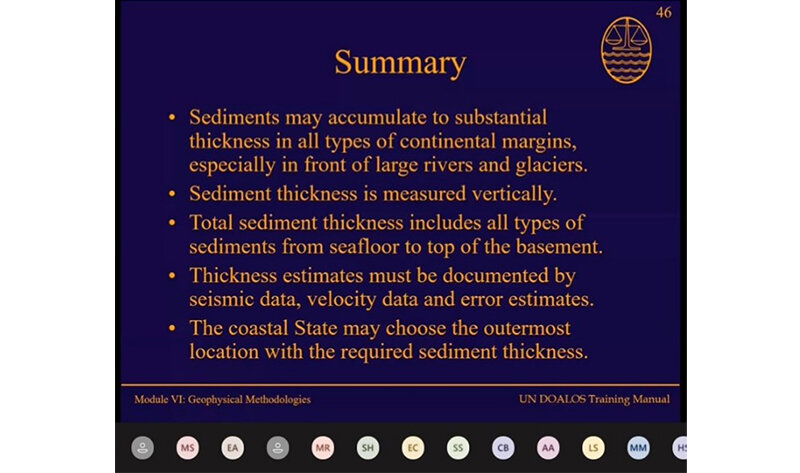
On 10 February and 28 March, the I-SSR team met with the South West State Parliament Speaker and the Chair of the Security and Reconciliation Committee, and Galmudug Parliament Speaker and the Chair of the Security Committee, respectively. The meetings highlighted the growing challenges of both Assemblies to oversee the security sector in an efficient manner, due to a lack of resources and technical expertise. The legislators welcomed capacity building support to review their State security legislative priorities and enhance parliamentary oversight of the security reforms undertaken in South West and Galmudug, as well as parliamentary consultations in Baidoa and Dhusamareb to encourage civil society participation in the security political debate.
The fact that the FMS Legislatures are ready to step up their efforts to enhance scrutiny of the security reforms is a positive development, as with any other policy area, even though Parliaments retains supreme responsibility to hold the government accountable and exercise civilian oversight of the security sector, recent institutional development and civilian oversight capacity building efforts have mainly focused on the Executive Institutions.
Joint Security Sector Governance Programme upcoming closure
The Joint Security Sector Governance Programme (JSSGP) is coming to an end on the 30 June 2021. The programme was valued at approximately 10 million USD and supported in total 15 security oversight institutions with direct funding and 2 more (Federal and State parliaments) with technical capacity building.
The JSSGP commenced in 2019 and was set to close on 31 December 2020, but was granted a six-month extension by its Programme Steering Committee, offering a transition phase for the beneficiary institutions dependent on the programme to prepare for the closure. The extension also entailed rigorous reforms in programme management and increased oversight, as well as creating space for the I-SSR team to reconfigure its support to security sector governance in Somalia by exploring leaner and more targeted interventions to improve the capacity and professionalism of security oversight institutions across the country.
The JSSGP offered a unique opportunity for the UN to collaborate with all key security oversight institutions at the Federal level and in 5 FMSs, and was able to identify operational and capacity building challenges. Support to security oversight institutions will remain crucial to ensure civilian and democratic oversight over the security forces, including working with parliaments to increase their capacity to hold line ministries and security forces accountable.
The UN is developing the foundations for a new programme in close consultation with relevant stakeholders with a view to develop tailored programmatic support on security sector governance, focused on advancing Federal-State dialogue on security and civilian oversight of the federated security model.
Delivery of office equipment to Regional Security Offices (RSO)
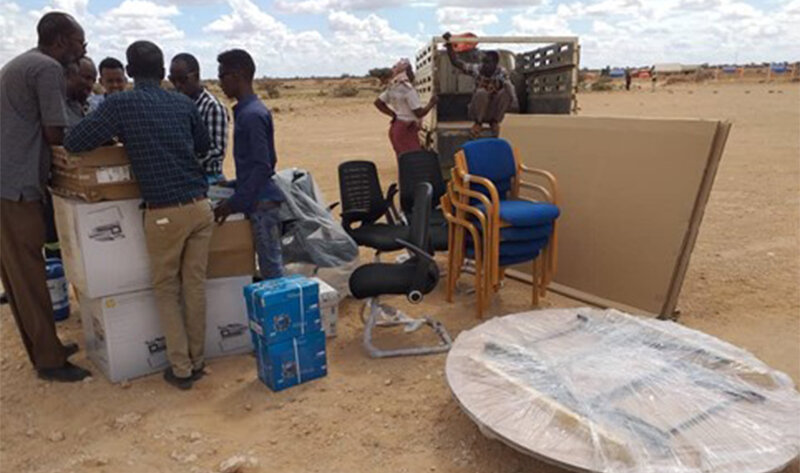
Despite the challenges posed by COVID-19, delivery of office equipment in support of Regional Security Offices (RSOs) has made significant advancements in the January-April 2021 period. RSOs represent an important institution in the context of Somalia’s security policy implementation, contributing to effective decision-making and co-ordination of security programmes between the FGS and FMS. In 2020-21 RSOs have played a central role in coordinating the civilian oversight function over Somalia’s security sector, working in partnership with the Office of National Security (ONS) and the Office of the Prime Minister (OPM) and international partners. RSOs have also provided strategic advice on security and justice sector reforms.
The I-SSR team has been supporting RSOs in their capacity building efforts through activities such as the supply of office equipment, purchased with the support of the Danish Government Trust Fund. The bulk of this equipment was delivered in 2020, with additional items delivered in early 2021 to UNSOM field offices for onward handover to the RSOs. Equipment included laptops, printers, office furniture and stationery, which helped RSOs better deliver support in-line with the National Security Architecture (NSArch), by keeping close liaison with the National Security Office (NSO) and working as the Secretariat of the Regional Security Council (RSC).
Somalia’s Security Advisory Unit (SAU) has initiated comprehensive aid mapping efforts that will help the collective understanding of support being given to the rule of law and security sector within the country.
Aid mapping efforts launched by the SAU, conducted with the support of UNSOM and other international partners, will improve the collective visibility of the external aid that Somalia receives for the promotion of rule of law and security institutions, within the context of the seven Strands of the Comprehensive Approach to Security (CAS), which in turn link directly to the National Development Plan (NDP) 9 and the 2021 Mutual Accountability Framework (MAF). This information will support the decision-making of high-level bodies such as the Security & Justice Committee (SJC) of the CAS Secretariat, chaired by the Prime Minister and sitting within the Office of the Prime Minister (OPM). The spectrum of support activities that will be covered includes financial and non-financial aid, such as the delivery of training to the military and police by international partners.
 UN
UN
